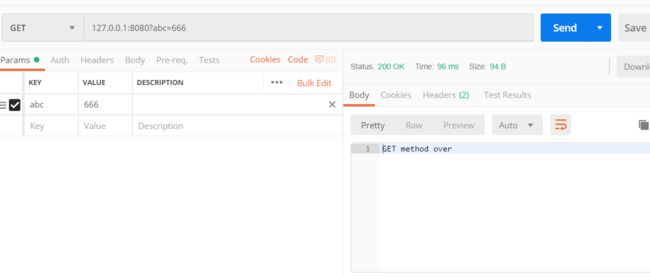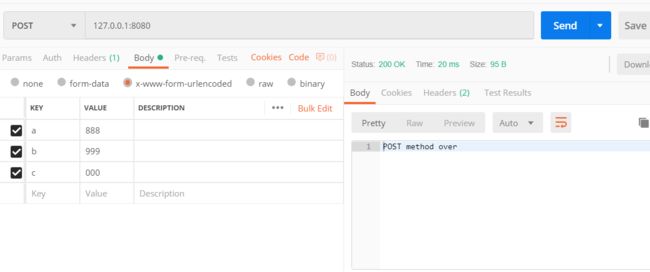Netty 实现http请求 并响应
什么是Netty?
Netty 是一个利用Java 的高级网络的能力,隐藏其背后的复杂性而提供一个易于使用的API 的客户端/服务器 框架。
Netty 与 Tomcat
Netty与tomcat 最大的区别在于通信协议。Tomcat 是基于Http 协议的,它的实质是一个基于Http协议的web 容器。
但是Netty 不一样,它能通过编程自定义各种协议,因为netty能够通过codec 自己来编码/解码 字节流。完成类似redis访问的功能。
这就是netty 和tomcat 最大的不同
Netty 实现接受http 请求及响应
NettyHttpServerHandler 实际处理的handler,可以处理get 和post 请求
package com.damai;
import com.alibaba.fastjson.JSONObject;
import io.netty.buffer.ByteBuf;
import io.netty.buffer.Unpooled;
import io.netty.channel.ChannelFutureListener;
import io.netty.channel.ChannelHandlerContext;
import io.netty.channel.SimpleChannelInboundHandler;
import io.netty.handler.codec.http.DefaultFullHttpResponse;
import io.netty.handler.codec.http.FullHttpRequest;
import io.netty.handler.codec.http.FullHttpResponse;
import io.netty.handler.codec.http.HttpMethod;
import io.netty.handler.codec.http.HttpResponseStatus;
import io.netty.handler.codec.http.HttpVersion;
import io.netty.handler.codec.http.QueryStringDecoder;
import io.netty.handler.codec.http.multipart.DefaultHttpDataFactory;
import io.netty.handler.codec.http.multipart.HttpPostRequestDecoder;
import io.netty.handler.codec.http.multipart.InterfaceHttpData;
import io.netty.handler.codec.http.multipart.MemoryAttribute;
import io.netty.util.CharsetUtil;
import io.netty.util.internal.StringUtil;
import java.io.UnsupportedEncodingException;
import java.nio.charset.Charset;
import java.util.HashMap;
import java.util.List;
import java.util.Map;
/**
* @ClassName NettyHttpServerHandler
* @Description 自定义处理的Handler
* @Author xl
* @Date 2019/8/27 11:30
* @Version 1.0
*/
public class NettyHttpServerHandler extends SimpleChannelInboundHandler {
@Override
protected void channelRead0(ChannelHandlerContext channelHandlerContext, FullHttpRequest fullHttpRequest) throws Exception {
System.out.println(fullHttpRequest);
FullHttpResponse response = null;
if(fullHttpRequest.method() == HttpMethod.GET){
System.out.println(getGetParamsFromChannel(fullHttpRequest));
String data = "GET method over";
ByteBuf buf = copiedBuffer(data, CharsetUtil.UTF_8);
response = responseOk(HttpResponseStatus.OK,buf);
}else if(fullHttpRequest.method() == HttpMethod.POST){
System.out.println(getPostParamsFromChannel(fullHttpRequest));
String data = "POST method over";
ByteBuf buf = copiedBuffer(data, CharsetUtil.UTF_8);
response = responseOk(HttpResponseStatus.OK,buf);
}else{
response = responseOk(HttpResponseStatus.INTERNAL_SERVER_ERROR,null);
}
// 发送响应
channelHandlerContext.writeAndFlush(response).addListener(ChannelFutureListener.CLOSE);
}
private ByteBuf copiedBuffer(String data, Charset utf8) {
return Unpooled.wrappedBuffer(data.getBytes());
}
private Map getPostParamsFromChannel(FullHttpRequest fullHttpRequest) {
Map params = new HashMap<>();
if(fullHttpRequest.method() == HttpMethod.POST){
// 处理post 请求
String strContentType = fullHttpRequest.headers().get("Content-Type").trim();
if(StringUtil.isNullOrEmpty(strContentType)){
return null;
}
if(strContentType.contains("x-www-form-urlencoded")){
params = getFormParams(fullHttpRequest);
}else if(strContentType.contains("application/json")){
params = getJSONParams(fullHttpRequest);
}else {
return null;
}
}
return params;
}
private Map getJSONParams(FullHttpRequest fullHttpRequest) {
Map params = new HashMap<>();
ByteBuf content = fullHttpRequest.content();
byte[] reqContent = new byte[content.readableBytes()];
content.readBytes(reqContent);
String strContent = null;
try {
strContent = new String(reqContent, "UTF-8");
} catch (UnsupportedEncodingException e) {
e.printStackTrace();
}
JSONObject jsonParams = JSONObject.parseObject(strContent);
for (Object key : jsonParams.keySet()) {
params.put(key.toString(), jsonParams.get(key));
}
return params;
}
private Map getFormParams(FullHttpRequest fullHttpRequest) {
Map params = new HashMap<>();
HttpPostRequestDecoder decoder = new HttpPostRequestDecoder(new DefaultHttpDataFactory(false), fullHttpRequest);
List postData = decoder.getBodyHttpDatas();
for (InterfaceHttpData data : postData) {
if (data.getHttpDataType() == InterfaceHttpData.HttpDataType.Attribute) {
MemoryAttribute attribute = (MemoryAttribute) data;
params.put(attribute.getName(), attribute.getValue());
}
}
return params;
}
private FullHttpResponse responseOk(HttpResponseStatus status, ByteBuf buf) {
FullHttpResponse response = new DefaultFullHttpResponse(HttpVersion.HTTP_1_1,
status,buf);
if(buf != null){
response.headers().set("Content-Type","text/plain;charset=UTF-8");
response.headers().set("Content-Length",response.content().readableBytes());
}
return response;
}
private Map getGetParamsFromChannel(FullHttpRequest fullHttpRequest) {
Map params = new HashMap<>();
if(fullHttpRequest.method() == HttpMethod.GET){
QueryStringDecoder decoder = new QueryStringDecoder(fullHttpRequest.uri());
Map> paramList = decoder.parameters();
for(Map.Entry> entry : paramList.entrySet()){
params.put(entry.getKey(),entry.getValue().get(0));
}
return params;
}
return params;
}
}
Server 端启动程序
package com.damai;
import io.netty.bootstrap.ServerBootstrap;
import io.netty.channel.ChannelFuture;
import io.netty.channel.ChannelInitializer;
import io.netty.channel.EventLoopGroup;
import io.netty.channel.nio.NioEventLoopGroup;
import io.netty.channel.socket.SocketChannel;
import io.netty.channel.socket.nio.NioServerSocketChannel;
import io.netty.handler.codec.http.HttpObjectAggregator;
import io.netty.handler.codec.http.HttpRequestDecoder;
import io.netty.handler.codec.http.HttpResponseEncoder;
import io.netty.handler.stream.ChunkedWriteHandler;
/**
* @ClassName NettyHttpServer
* @Description TODO
* @Author xl
* @Date 2019/8/27 12:09
* @Version 1.0
*/
public class NettyHttpServer {
private int inetPort;
public NettyHttpServer(int inetPort) {
this.inetPort = inetPort;
}
public int getInetPort() {
return inetPort;
}
public void init() throws Exception {
EventLoopGroup parentGroup = new NioEventLoopGroup();
EventLoopGroup childGroup = new NioEventLoopGroup();
try {
ServerBootstrap server = new ServerBootstrap();
// 1. 绑定两个线程组分别用来处理客户端通道的accept和读写时间
server.group(parentGroup, childGroup)
// 2. 绑定服务端通道NioServerSocketChannel
.channel(NioServerSocketChannel.class)
// 3. 给读写事件的线程通道绑定handler去真正处理读写
// ChannelInitializer初始化通道SocketChannel
.childHandler(new ChannelInitializer() {
@Override
protected void initChannel(SocketChannel socketChannel) throws Exception {
// 请求解码器
socketChannel.pipeline().addLast("http-decoder", new HttpRequestDecoder());
// 将HTTP消息的多个部分合成一条完整的HTTP消息
socketChannel.pipeline().addLast("http-aggregator", new HttpObjectAggregator(65535));
// 响应转码器
socketChannel.pipeline().addLast("http-encoder", new HttpResponseEncoder());
// 解决大码流的问题,ChunkedWriteHandler:向客户端发送HTML5文件
socketChannel.pipeline().addLast("http-chunked", new ChunkedWriteHandler());
// 自定义处理handler
socketChannel.pipeline().addLast("http-server", new NettyHttpServerHandler());
}
});
// 4. 监听端口(服务器host和port端口),同步返回
// ChannelFuture future = server.bind(inetHost, this.inetPort).sync();
ChannelFuture future = server.bind(this.inetPort).sync();
// 当通道关闭时继续向后执行,这是一个阻塞方法
future.channel().closeFuture().sync();
} finally {
childGroup.shutdownGracefully();
parentGroup.shutdownGracefully();
}
}
public static void main(String[] args) {
NettyHttpServer server = new NettyHttpServer(8080);
try {
server.init();
} catch (Exception e) {
e.printStackTrace();
System.err.println("exception: " + e.getMessage());
}
System.out.println("server close!");
}
} 服务端启动后,可以通过postman 进行请求模拟:
get请求:
HttpObjectAggregator$AggregatedFullHttpRequest(decodeResult: success, version: HTTP/1.1, content: CompositeByteBuf(ridx: 0, widx: 0, cap: 0, components=0))
GET /?abc=666 HTTP/1.1
cache-control: no-cache
Postman-Token: fc519c93-cb2b-4ef1-b002-9f5b02834bc2
User-Agent: PostmanRuntime/7.6.0
Accept: */*
Host: 127.0.0.1:8080
accept-encoding: gzip, deflate
Connection: keep-alive
content-length: 0
{abc=666}post请求:
HttpObjectAggregator$AggregatedFullHttpRequest(decodeResult: success, version: HTTP/1.1, content: CompositeByteBuf(ridx: 0, widx: 17, cap: 17, components=1))
POST / HTTP/1.1
Content-Type: application/x-www-form-urlencoded
cache-control: no-cache
Postman-Token: de61613e-ef01-405f-9a24-3976449f3428
User-Agent: PostmanRuntime/7.6.0
Accept: */*
Host: 127.0.0.1:8080
accept-encoding: gzip, deflate
content-length: 17
Connection: keep-alive
{a=888, b=999, c=000}

